|
|
|
Sort Order |
|
|
|
Items / Page
|
|
|
|
|
|
|
| Srl | Item |
| 1 |
ID:
077452
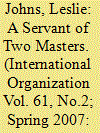

|
|
|
|
|
| Publication |
2007.
|
| Summary/Abstract |
International bureaucrats must often serve multiple principals who collectively choose policy. How does this affect bureaucrats' incentives to truthfully reveal their private information? I construct a cheap talk model in which a bureaucrat possesses private information about how policies translate into outcomes. The bureaucrat can communicate publicly observable messages about this information to two policymakers, who must then bargain over a set of policy choices. I find that both the bureaucrat's willingness to communicate informatively and the choice of an optimal bureaucrat are highly contingent on the bargaining powers of the two policymakers. When each policymaker is bound to adhere to the bargaining outcome, "moderate" bureaucrats are most preferred. In contrast, when at least one policymaker can leave the bargaining table and exercise an outside option, "biased" bureaucrats can be optimal. I illustrate my findings by examining UN weapons inspections in Iraq from 1991 to 2003.
|
|
|
|
|
|
|
|
|
|
|
|
|
|
|
|
| 2 |
ID:
113823
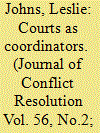

|
|
|
|
|
| Publication |
2012.
|
| Summary/Abstract |
Why do states build international courts, submit cases, and enforce court judgments? This article examines the role of a court that is neither a "decider" nor an "information provider." Litigation is costly and does not reveal private information. The court's ruling is not binding and bargaining can occur before and after the court has ruled. Nevertheless, an alternative dispute resolution mechanism emerges: court rulings can coordinate endogenous multilateral enforcement. Disinterested states will enforce to ensure that they can profitably use the court in the future. Accepting jurisdiction of the court allows a state to make efficiency-enhancing "trades," winning high-value disputes in exchange for losing low-value disputes. This is possible because litigation is a screening device: states only sue when they derive relatively high value from the disputed asset. The use of the court as a coordination device for multilateral enforcement allows for the existence of a court with endogenous enforcement and jurisdiction.
|
|
|
|
|
|
|
|
|
|
|
|
|
|
|
|
| 3 |
ID:
068870
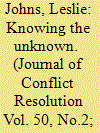

|
|
|
| 4 |
ID:
187657
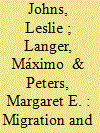

|
|
|
|
|
| Summary/Abstract |
Domestic courts sometimes prosecute foreign nationals for severe crimes—like crimes against humanity, genocide, torture, and war crimes—committed on foreign territory against foreign nationals. We argue that migrants can serve as agents of transnational justice. When migrants move across borders, as both economic migrants and refugees, they often pressure local governments to conduct criminal investigations and trials for crimes that occurred in their sending state. We also examine the effect of explanatory variables that have been identified by prior scholars, including the magnitude of atrocities in the sending state, the responsiveness of the receiving state to political pressure, and the various economic and political costs of prosecutions. We test our argument using the first multivariate statistical analysis of universal jurisdiction cases, focusing on multiple stages of prosecutions. We conclude that transnational justice is a justice remittance in which migrants provide accountability and remedies for crimes in their sending states.
|
|
|
|
|
|
|
|
|
|
|
|
|
|
|
|
| 5 |
ID:
093681
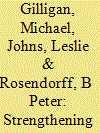

|
|
|
|
|
| Publication |
2010.
|
| Summary/Abstract |
How does variation in the strength of a court's jurisdiction and enforcement affect strategic behavior by states involved in international disputes? The authors construct a formal model and identify three important ways that legal institutions can have a deleterious effect on international cooperation by magnifying the bargaining problems arising from incomplete information about the quality of the legal claims. First, strong courts create less information revelation in pretrial bargaining. Second, strong courts reduce the likelihood of pretrial settlements between states. Third, strong courts lead to more brinksmanship over high-value assets, which leads to conflict if the court refuses to intervene. The authors argue that a key policy implication of their model is that attempts to strengthen international courts must be accompanied by increased precision of international law to ameliorate the deleterious effects of strong courts.
|
|
|
|
|
|
|
|
|
|
|
|
|
|
|
|
| 6 |
ID:
145083
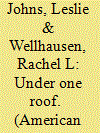

|
|
|
|
|
| Summary/Abstract |
We argue that economic links, such as supply chains, can create a common roof that protects foreign investors in host countries that lack strong institutions to protect property rights. Supply chains link the activities of firms: when a host government breaks a contract with one firm, other firms in the supply chain are harmed. These partner firms therefore have incentive to protect one another’s property rights. This leads to the key implication of our argument: host governments are less likely to violate the property rights of firms that are more tightly linked with other firms in the host economy. We test our argument with cross-national data on investment arbitration, a survey of US multinational subsidiaries in Russia, and case studies from Azerbaijan. Our findings imply that one benefit of outsourcing in developing and transition economies is the creation of a network of partner firms that protect each other’s property rights.
|
|
|
|
|
|
|
|
|
|
|
|
|
|
|
|
| 7 |
ID:
133277
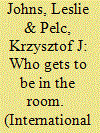

|
|
|
|
|
| Publication |
2014.
|
| Summary/Abstract |
Third parties complicate World Trade Organization (WTO) dispute settlement by adding voices and issues to a dispute. However, complainants can limit third parties by filing cases under Article XXIII of the General Agreement on Tariffs and Trade (GATT), rather than Article XXII. We argue that third parties create "insurance" by lowering the benefit of winning and the cost of losing a dispute. We construct a formal model in which third parties make settlement less likely. The weaker the complainant's case, the more likely the complainant is to promote third party participation and to settle. Article XXII cases are therefore more likely to settle, controlling for the realized number of third parties, and a complainant who files under Article XXIII is more likely to win a ruling and less likely to see that ruling appealed by the defendant. We provide empirical support using WTO disputes from 1995 to 2011.
|
|
|
|
|
|
|
|
|
|
|
|
|
|
|
|
|
|
|
|
|